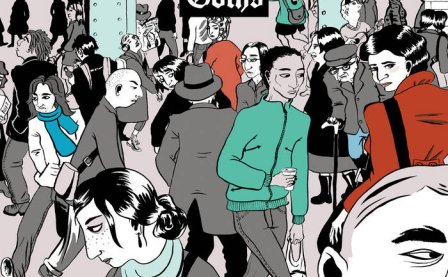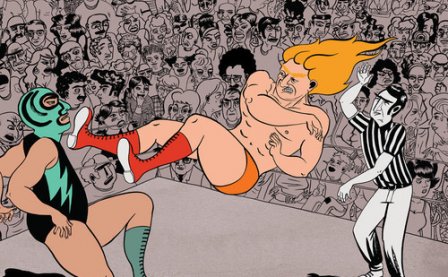The year’s 2041. You flip on the TV in your spacious seaside apartment just after dusk. It’s switched to PBS (because you’re old, or whatever) and, heralded by a fanfare and some swooshy graphics, a new American Masters program is just beginning: John Darnielle, Tapedeck Jongleur. I know what you’re thinking — “PBS” and “television” would probably only still exist in the sort of Jetsons retrofuture where single-pill meals and glass-tube highways predate the internet — but is it that implausible that The Mountain Goats might eventually find a place in the pantheon of great American songwriters prominent enough to warrant primetime public-broadcasting glory?
Imagine if, God forbid, Darnielle were to die tomorrow. There’d be tributes on the relevant websites, pieces in the Times and the Post, a whirl of zealous mythologizing from the fanbase, and a tragic outcry to match the manner of his demise. If death could whitewash the conflicted existence of Michael Jackson, what would it do to the life of a man who swore to keep on touring till he was physically unable, who uplifted masses of bespectacled square pegs, who within the final weeks of his life raised thousands of bucks for Japanese earthquake relief with a single auctioned song? What place would he occupy in the broader narrative of folk music: Tim Buckley or Jeff Buckley, Dylan or Donovan? In many ways, All Eternals Deck, his greatest work since 2005’s The Sunset Tree, is the perfect final album, fixated on death, legacy, survival, and an uncertain future. That’s a pretty morbid way to praise a guy, but not totally out of line for a writer whose most oft-shouted line goes “I hope I die!/ I hope we both die!”
The Mountain Goats’ ability to wring pathos from subjects as disparate and outlandish as sterilizing lab equipment and Grendel’s mother, the predominant reason for Darnielle’s deserved National Treasure status, feels more pronounced than ever on this record. Track after track, he alchemizes strained metaphors into gut-level salvos of cock-eyed verse. “Sourdoire Valley Song” turns the recently disproven theory that the Neanderthal sub-species was an evolutionary dead-end into an affecting cry of empathy for those doomed to leave no mark on the world. Conversely, the vein-coursing, quintessential Darnielle shouter “Estate Sale Sign” applies the vocabulary of holy wars to the objects that we inadvertently leave behind with the dissolution of relationships. While prehistoric man of the former song laments how “the grass grows up to cover up/ The fire pit and the forge,” the lapsed couple of the latter work to rid themselves of “the things that we can’t even give away.”
Arrangements remain a secondary concern, as they should on an album so lyrically rich, but a few musical moments stand out. “The Autopsy Garland” bears the only real discernible manifestations of the much-talked-about influence of Morbid Angel guitarist-producer Erik Rutan, with its alluvial bass and whip-crack toms adding portent to an already uneasy depiction of a young Judy Garland’s brusque handling (both physical and psychological) by MGM executives. Richly self-serious pre-war-sounding (WWII, that is) harmonies fill out “High Hawk Season,” itself obviously inspired by the cult 1979 gangland fantasy flick The Warriors, adding eerie weight to fundamentally pulpy subject matter. Beyond an arabesque string arrangement on “Age of Kings,” most of these melodies feel like we’ve heard them before on other Mountain Goats records, which is more a testament to the consistency of the discography than a criticism of Darnielle’s songcraft.
All Eternals Deck’s first and finest track, “Damn These Vampires,” provides, perhaps, an unintentional answer to my earlier gruesome hypothetical. John Darnielle is unkillable. He has been bitten and cursed with immortality, and the fang-pierced are doomed to “sleep like dead men/ Wake up like dead men.” While the cause of his eternality is debatable — Vampiric infection or indelible oeuvre — the man behind the Goats will surely abide.
More about: The Mountain Goats




